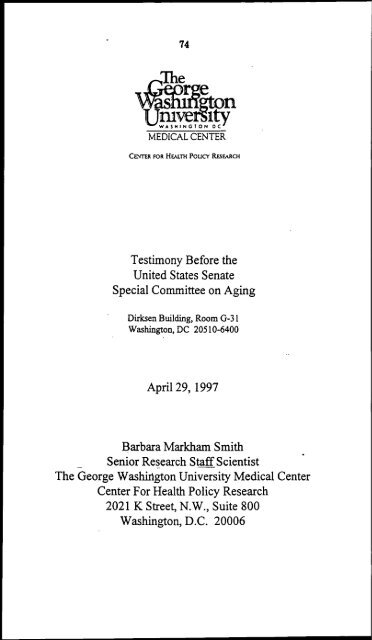Medicaid Managed Care - U.S. Senate Special Committee on Aging
Medicaid Managed Care - U.S. Senate Special Committee on Aging Medicaid Managed Care - U.S. Senate Special Committee on Aging
73 This has pretty serious implications for the disabled population where, if a plan is not providing services, they are particularly at risk. The State's ability to come in and pull them out of a plan because their enrollment is now the property of the plan becomes very difficult. So these kinds of issues in pending legislation are going to have a significant impact on your ability to move these populations in. If plans have pre-termination rights, you may have to reconsider how quickly and how much and what extent of services you are going to put into managed care plans. The other issue in terms of what is going on right now that will affect the disabled populations is in the current plans for Medicare and choices of plans. In other words, people now will start getting, as Federal employees get, a packet of materials where they can choose their plan or they can go into the traditional Medicare program. Obviously, the expectation-if you do not choose a plan, you automatically go into the traditionally Medicare program. The default provisions right now, default enrollment into traditional Medicare, are now regarded as somewhat ambiguous. That is, everybody thinks that people who do not enroll are going to go into the main Medicare program, but the language itself is somewhat ambiguous, so that theoretically, it would be possible through regulation or subsequent legislation or whatever to have something else happening with those default enrollees. I think that if this is an area where everyone has very clear expectations about what they think is going to happen, you need to be sure that the legislative language clearly reflects that expectation. Given the fact that certainly in Medicare managed care, there is also a similar lack of experience with disabled populations, you want to be sure that you are not pushing people into these systems sooner than these systems are ready to take them in. I think at this point I'll stop. [The prepared statement of Ms. Smith follows:]
74 .The WASHNTND MEDICAL CENTER CENTER FOR HEALTH PoucY RESEARCH Testimony Before the United States
- Page 27 and 28: 22 Kathy. STATEMENT OF KATHLEEN H.
- Page 29 and 30: 24 even lead to an improvement-but
- Page 31 and 32: 26 MANAGED CARE AND LONG TERM T h e
- Page 33 and 34: Consortium for C. 20249&Oid Citizen
- Page 35 and 36: 30 11 Managed care
- Page 37 and 38: Strong Oualitv Assurance Measures 3
- Page 39 and 40: NATIONAL ASSOCIATION 34 DEVELOPMENT
- Page 41 and 42: 36 Mrs. M.'s care plan is quite com
- Page 43 and 44: 38 nurses and social workers be ava
- Page 45 and 46: 40 EXPENDITURES FOR NURSING HOMES S
- Page 47 and 48: REQUIRES THE SKILL OF A HIGHLY TRAI
- Page 49 and 50: 44 ALZHEIMER'S DISEASE AND RELATED
- Page 51 and 52: 46 WITHOUT ADEQUATE RESPITE CARE, I
- Page 53 and 54: 48 PROBLEM FOR PEOPLE SUFFERING FRO
- Page 55 and 56: 50 Ms. CHRISTENSEN. Thank you. Don.
- Page 57 and 58: 52 it will eradicate the virus. Man
- Page 59 and 60: I 54 Today I participate in a state
- Page 61 and 62: 56 Ms. CHRISTENSEN. Thank you. [Ina
- Page 63 and 64: 58 rather than to community-based s
- Page 65 and 66: 60 now has to start looking at thin
- Page 67 and 68: 62 plan for that matter, can measur
- Page 69 and 70: 64 ual is getting state-of-the-art
- Page 71 and 72: 66 a larger population of people wi
- Page 73 and 74: 68 of recovery or rehabilitation th
- Page 75 and 76: 70 are entitled to renew their pres
- Page 77: 72 point and say that Patsy comes f
- Page 81 and 82: 76 exceptions - have largely based
- Page 83 and 84: 78 Plans have not shown a willingne
- Page 85 and 86: eligible people and for the program
- Page 87 and 88: Table l.b Selected Provisions Relat
- Page 89 and 90: VariiaIioils in rownlr-c1t language
- Page 91 and 92: Variations in cbonIlrlcl Is1sgu;age
- Page 94 and 95: Executive Summary 1. Setting the Co
- Page 96 and 97: age, which pays for those M
- Page 98 and 99: This consensus building exercise is
- Page 100 and 101: 95 Ms. CHRISTENSEN. I'm going to in
- Page 102 and 103: 97 abled population will all need s
- Page 104 and 105: 5601 Smetua- Drive PO. r,. 9310 Mmn
- Page 106 and 107: 101 Our experience with the AFDC po
- Page 108 and 109: 103 I have tried to list both the o
- Page 110 and 111: 105 BACKGROUND INFORMATION PATRICIA
- Page 112 and 113: 164 Communicating the Quality Messa
- Page 114 and 115: 166 Communicating the Quality Messa
- Page 116 and 117: 168 Communicating the Quality Messa
- Page 118 and 119: 170 Communicating the Quality Messa
- Page 120 and 121: 172 Communicating the Quality Messa
- Page 122 and 123: 174 Communicating the Quality Messa
- Page 124 and 125: 119 Dr. SCANLON. In this series of
- Page 126 and 127: 121 lation in managed care in Minne
74<br />
.The<br />
WASHNTND<br />
MEDICAL CENTER<br />
CENTER FOR HEALTH PoucY RESEARCH<br />
Testim<strong>on</strong>y Before the<br />
United States <str<strong>on</strong>g>Senate</str<strong>on</strong>g><br />
<str<strong>on</strong>g>Special</str<strong>on</strong>g> <str<strong>on</strong>g>Committee</str<strong>on</strong>g> <strong>on</strong> <strong>Aging</strong><br />
Dirksen Building, Room G-3 1<br />
Washingt<strong>on</strong>, DC 20510-6400<br />
April 29, 1997<br />
Barbara Markham Smith<br />
Senior Research Staff Scientist<br />
The George Washingt<strong>on</strong> University Medical Center<br />
Center For Health Policy Research<br />
2021 K Street, N.W., Suite 800<br />
Washingt<strong>on</strong>, D.C. 20006



